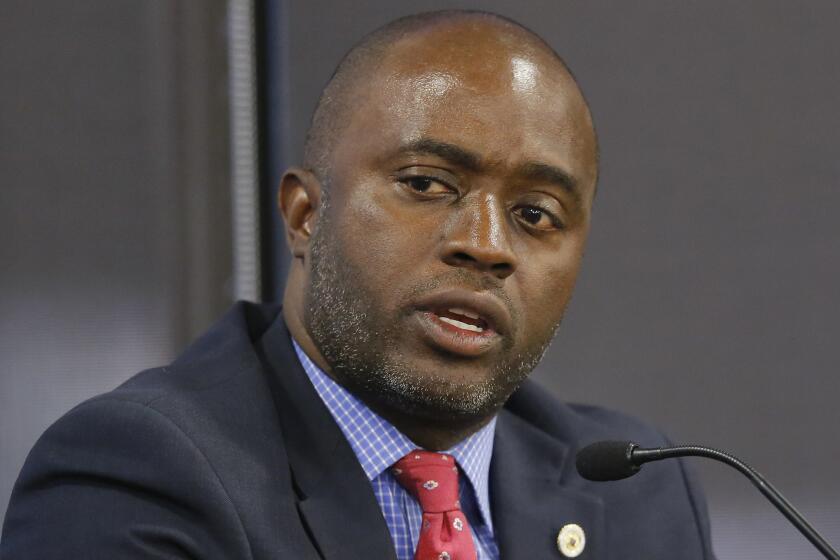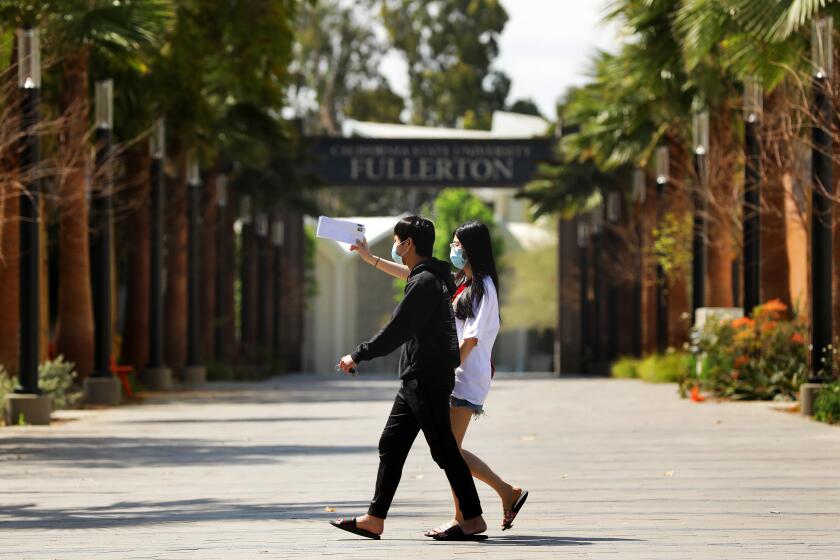UC makes landmark decision to drop ACT and SAT requirement for admission
- Share via
In a decision that could reshape the nation’s college admissions process, University of California regents unanimously voted Thursday to suspend SAT and ACT testing requirements through 2024 and eliminate them for California students by 2025.
The action by the nation’s premier public university system could mark a turning point in the long-running debate over whether the standardized tests unfairly discriminate against disadvantaged students or provide a useful tool to evaluate college applicants.
Some hailed the vote as a bold and visionary move to expand access and equity. But others expressed concern that dumping the tests would lead to grade inflation, admission of less-prepared students and backlash over different entry standards for different classes.
“It’s an incredible step in the right direction,” said John A. Pérez, chair of the UC Board of Regents.
Lt. Gov. Eleni Kounalakis, an ex officio regent, called the vote “the beginning of the end” for the SAT. “We really are the first body to tackle this head-on and say enough is enough.”
After conflicting presentations by experts and lengthy debate, regents approved UC President Janet Napolitano’s five-year plan to ease out the SAT and ACT tests and develop the university system’s own assessment.
coronavirus: Officials doubt schools can reopen safely if they must cut budgets
Under the plan, standardized test results will be optional on applications for the next two years and then eliminated for California students in Years 3 and 4. By fall 2025, the UC system is aiming to have its own assessment. If none is developed by then, the university will drop the SAT and ACT tests entirely for California students and evaluate them using high school grades and a dozen other factors in its comprehensive review system.
Applicants from other states and countries could continue to use those tests, or possibly a new UC assessment.
UC has already suspended the SAT and ACT testing requirement for fall 2021 due to test cancellations triggered by the COVID-19 pandemic.
The debate featured divergent views among regents, researchers and campus officials. UC Berkeley Chancellor Carol Christ and Youlonda Copeland-Morgan, UCLA vice provost for enrollment management, criticized the tests as barriers to less-advantaged students.
But UC Riverside Chancellor Kim A. Wilcox said his campus — the most diverse in the UC system after Merced — has prospered using the current admissions process, winning top rankings for helping low-income, first-generation and underrepresented students succeed.
Some regents suggested that the UC system make the tests optional for a few years then pause to study the effects on students rather than approve a five-year plan. Regent William Um called for a vote to immediately eliminate or keep the tests rather than “kick the can down the road.”
The CDC laid out detailed guidelines for reopening schools, restaurants, transit systems and other businesses.
But Napolitano told regents that her plan would serve as a bridge to a new test or no test. “We need to move in a careful and studied way to a new future,” she said.
Though it is unclear whether other universities will follow UC’s action, the university’s size and status have long made it a central player in the standardized testing landscape. The 10-campus system is the largest single university source of customers for the College Board, which owns the test.
Four-fifths of freshman UC applicants — who numbered 172,000 last year — take the SAT. The six universities that receive the most applications in the nation are UC campuses in Los Angeles, San Diego, Irvine, Berkeley, Santa Barbara and Davis.
UC’s decision to require the SAT half a century ago catapulted the test to a place of national prominence, and its threat to drop it in the early 1990s prompted the College Board to revise the test.
Throughout the years, arguments over the value of the tests have intensified.
Critics say the SAT and ACT are heavily influenced by race, income and parental education levels; question the exams’ value in predicting college success; and express concern about inequitable access to test prep. Those concerns have prompted more than 1,000 colleges and universities to drop the testing requirement. A lawsuit against the UC system also calls for the requirement to be dropped.
CSU plans to cancel most in-person classes this fall and rely mainly on virtual instruction amid the coronavirus crisis, the chancellor announced Tuesday.
But the College Board and ACT strongly assert that their tests are not biased and that they reflect existing inequities in access to quality education. They also say that standardized tests offer a uniform and helpful yardstick for use, in tandem with grades, in assessing students in high schools across the country.
The College Board said that the UC action will compel many California students to take multiple tests to graduate from high school and apply to college —the future UC exam, the SAT and or the ACT, and the state’s K-12 assessment, known as Smarter Balanced. That will likely limit their options for college, the board said in a statement.
“Regardless of what happens with such policies, our mission remains the same: to give all students, and especially low-income and first generation students, opportunities to show their strength,” the testing nonprofit said. “We must also address the disparities in coursework and classrooms that the evidence shows most drive inequity in California.”
Marten Roorda, ACT chief executive, told regents in a letter this week that suspending the test requirement would exacerbate student anxieties, strain admissions offices and squeeze state and school budgets.
Several regents praised Napolitano for striking a compromise between the factions.
“She did an excellent job threading the needle,” said Vice Chair Cecilia Estolano, who called the SAT a “racist test.”
But some members of the powerful UC Academic Senate, which sets admission standards, said they were disheartened by what they saw as disregard of their research report on standardized testing, which Napolitano requested in 2018.
In what researchers called surprising findings, the Academic Senate’s review found that the SAT helps disadvantaged students gain entry to the selective UC system. That’s because the way UC uses standardized test scores substantially corrects for bias by weighting them less heavily than grades and considering them as only one of many factors in the review process. Campuses adjust for socioeconomic differences and admit disadvantaged students with lower test scores compared with more advantaged peers.
The task force recommended that the university system keep the SAT and ACT for now while researching alternatives, such as going test-optional or developing UC’s own assessment. That report was backed by the Senate assembly, made up of faculty leaders and campus representatives, on a 51-0 vote, with one abstention.
Other researchers, however, have criticized the task force’s findings as erroneous and ill-founded in rejecting proposals to replace the SAT and ACT with the K-12 assessment.
Eddie Comeaux, a UC Riverside professor who heads the Senate’s committee on admission standards and co-chaired the testing task force, said politics and public perceptions more than data appeared to drive the decision to a preordained conclusion.
But, he said, “The ship has sailed. Now UC needs to figure out how to advance equity without tests.”
Campus officials will be left with the task of figuring out how to apply the shifting admission requirements and evaluate tens of thousands of applicants without test scores.
Comeaux said those adjustments will be easier for six of nine undergraduate campuses that consider test scores as one of a dozen factors with no fixed weight assigned to any one of them. But it will take “heavy lifting,” he said, to make the transition at Santa Barbara, Riverside and Merced, which use fixed weights for test scores. All application readers will need training on how to avoid implicit bias against applicants who don’t submit scores, he added.
UC experts will launch a feasibility study this summer to identify a new test that assesses what the university expects students to master to demonstrate readiness for college.
More to Read
Sign up for Essential California
The most important California stories and recommendations in your inbox every morning.
You may occasionally receive promotional content from the Los Angeles Times.














